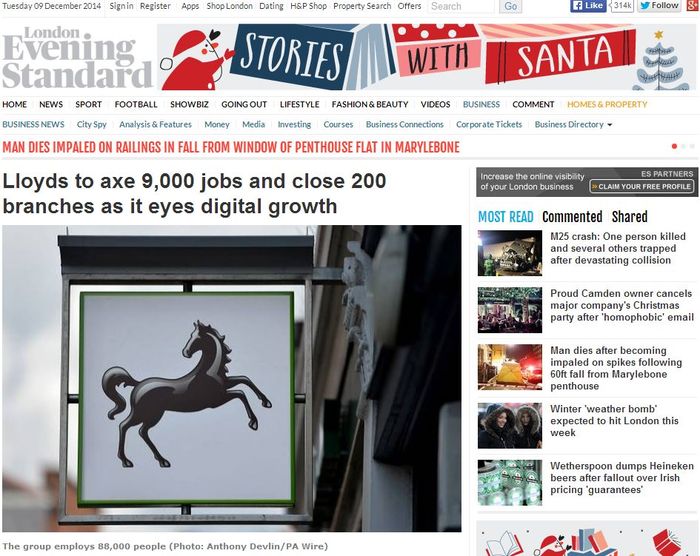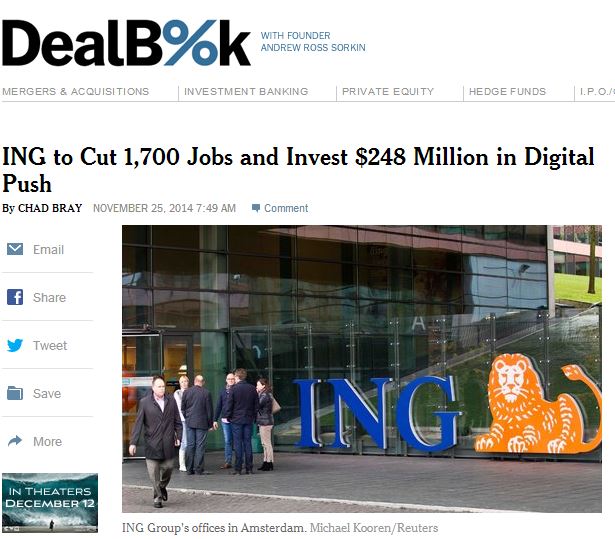
I blogged a short while ago about Coders being the new Rock Stars of Banking, and how JPMorgan and other banks were actively head hunting leaders in Google, Yahoo and other Silicon Valley leaders. So I was interested to see the headline yesterday, that Snapchat has hired Imran Khan, the former head of Internet banking at Credit Suisse, as its first chief strategy officer.
We have more instances of these moves such as Anthony Noto, the former Head of Goldman Sachs Technology, Media & Telecom Group, left the bank in May to become Chief Financial Officer for Twitter in July, whilst many bankers are moving from finance to work with or create their own tech startups.
This builds on my regular theme of a new industry being created: the fintech industry.
Fintech is the 21st century model of money, and wipes out the old banking model of the last century.
Fintech's foundations are based upon banking and technology being integrated as one, not separated as tw0, and is the core structure for digital value exchange in this century.
Fintech is the reason we are seeing Silicon Valley merge with Wall Street, and why there’s so much buzz about this new structure of banking and value exchange. It is the reason why there are so many investors in this area as illustrated by the FinTech 50, a report by KPMG that I spotted this week.
According to this report, “Global Fintech financing has grown from less than $930 million for the whole of 2008 to over $1.04 billion in the month of October 2014 alone”.
According to other reports, over $1 billion has been invested in European fintech thisyear with $1.4 billion of technology startup funds created in London in just the last six months.
This is a hot space, and getting hotter.
The reason it’s so hot is that it is the new model of money and finance. Distributing and providing investment, value and monetary exchange globally through the net. That’s fintech.
Some banks are shifting in this direction – note the headlines and job losses at Lloyds and ING recently …


In other words, the big shift that has really hit the headlines this year is that banking, as we knew it, is no more. Banking has merged with technology to create a new market called fintech. That’s where the money, the action and the future is and, if you’re not in it, you possibly don’t have a future.
Meanwhile, here are three lists that may provide insight.
First, IDC’s annual fintech company rankings shows:
- FIS
- Tata Consultancy Services Ltd
- Fiserv
- Cognizant Technology Solutions
- NCR Corp
- Infosys Ltd
- Diebold
- SunGard Data Systems
- Nomura Research Institute Ltd
- Wincor Nixdorf
And the 2014 FinTech Rankings for the Top 5 Enterprise companies are:
- IBM
- Hewett-Packard
- Dell
- Microsoft
- Accenture
What’s interesting is that these are providers rather than fintech firms themselves. So the Top 10 Fintech Innovators, according to KPMG, are:
- Wealthfront
- Kabbage
- Motif Investing
- Klarna
- Square
- Lending Club
- Ondeck
- Borro
- Kreditech
- Xero
And the FinTech50 2014 (a New Year’s list will be announced in January):
Abundance Generation
Accept Email
BehavioSec
BlueSpeck Financial
Borro
Bottomline Technologies
Brady
Credit Agricole Apps
Calastone
Digital Shadows
Dovetail
Duedil
Etronika
eToro
Fidor Bank
Five Degrees
Fixnetix
Free Agent
Funding Circle
GoCardless
Help my Cash
Holvi
Iwoca
ixaris
Klarna
Lemonway
Linedata
MBank
Meniga
Merit Software
Nagra ID
Nutmeg
OpenGamma
Openvoice
Pensions First
Perseus Telecom
Pingit
Seedrs
TBricks
The Currency Cloud
Thunderhead
Transferwise
Wonga
Zopa
Chris M Skinner
Chris Skinner is best known as an independent commentator on the financial markets through his blog, TheFinanser.com, as author of the bestselling book Digital Bank, and Chair of the European networking forum the Financial Services Club. He has been voted one of the most influential people in banking by The Financial Brand (as well as one of the best blogs), a FinTech Titan (Next Bank), one of the Fintech Leaders you need to follow (City AM, Deluxe and Jax Finance), as well as one of the Top 40 most influential people in financial technology by the Wall Street Journal's Financial News. To learn more click here...

